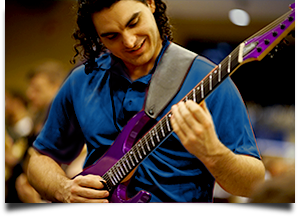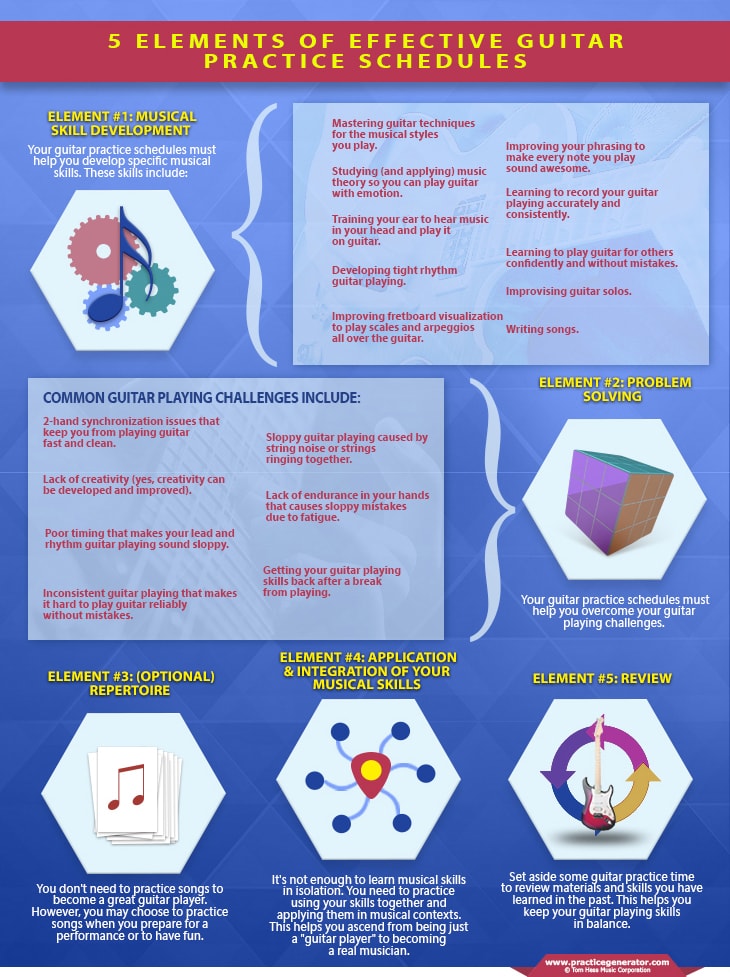5 Elements Of Effective Guitar Practice Schedules That Improve Your Guitar Playing
The
Most Fun Part
Of Your Day

That Helps You
Enjoy Practicing
Guitar A Lot More
You become a better guitarist fast when you follow the right guitar practice schedules.
Effective guitar practice schedules consist of 5 elements that improve your guitar playing:
Guitar Practice Element #1: Skill Development
Your guitar practice schedules must help you develop specific musical skills. These skills include:
- Mastering guitar techniques needed for the musical styles you play.
- Studying music theory (and learning to apply it). Music theory helps you play guitar with emotion.
- Training your ear. This skill helps you hear music in your head and immediately play it on guitar.
- Developing tight rhythm guitar playing. This skill is about playing cleanly, articulately, consistently and in time. You must work on this skill just like you practice any other guitar technique.
The
Most Fun Part
Of Your Day

That Helps You
Enjoy Practicing
Guitar A Lot More
- Improving your fretboard visualization with scales and arpeggios. This skill helps you fluently play scales and arpeggios all over the guitar.
- Improving your phrasing. This means how you play the notes in your guitar licks and solos.
- Learning to record your guitar playing accurately and consistently (yes, this is a skill you can practice and improve, just like anything else in your guitar playing).
- Learning to play guitar for others confidently and without mistakes (this is also a skill you can practice and master, just like any other skill).
- Improvising guitar solos over backing tracks or songs (if you have this goal).
- Writing songs, refining songs, analyzing songs of other musicians (if you have this goal).
(Each of these general skills can be broken down further into many smaller elements.)

Guitar Practice Element #2: Problem Solving
You will face many challenges in the process of reaching your musical goals. These challenges are unique to you and your guitar playing. Your guitar practice schedules need to help you overcome challenges, such as:
- 2-hand synchronization issues - when your hands aren’t in sync, it’s impossible to play guitar fast and clean.
- Lack of creativity - musical creativity is a skill you must practice (and improve). There are specific guitar practice strategies that make your guitar playing more creative.
- Poor timing - playing in time improves your rhythm and lead guitar playing.
- Lack of consistency in your guitar playing - “consistency” is about playing guitar reliably without mistakes.
- Sloppy guitar playing due to excess string noise or strings ringing together when they shouldn’t be.
- Lack of endurance in your hands. This makes it hard to play guitar for a long period of time without becoming tired.
- Getting your guitar skills back after a break from playing. You should create different guitar practice schedules to restore your skills after a break compared to your typical guitar practice schedules.
 How To Enjoy Practicing Guitar
How To Enjoy Practicing GuitarLearn how to have fun as you become a much better guitarist.
 Secrets To Better Guitar Practice
Secrets To Better Guitar PracticeLearn (for free) the best ways to build better guitar playing skills.
 How To Practice Guitar Effectively
How To Practice Guitar EffectivelyTest yourself to see how effective
you are with your guitar practice.
(Optional) Guitar Practice Element #3: Repertoire (Learning And Practicing Songs)
You don't need to learn songs to become a great guitar player. However, you may choose to practice songs, if:
- You are rehearsing specific songs for a live performance.
- You are analyzing songs to improve your songwriting and creativity.
- You want to learn a specific song for fun.
Be honest with yourself about why you want to learn songs. This helps you determine how much time to spend on this area of your guitar practice.
Guitar Practice Element #4: Application And Integration Of Your Guitar Playing Skills
Guitar Playing skills developed in isolation mean very little. You need to apply your knowledge and skills to musical contexts. You also need to integrate (combine) your skills together. This 3-tier approach leads to musical mastery.
This video explains how application and integration are used in guitar practice:
Example: You learn to play a scale sequence in isolation and practice building it up to your desired speed. That is the 1st tier of mastery.
Next, you practice using the sequence over various chord changes. You learn how to transpose it to other keys and understand what chords it can be played over. This is application - the 2nd tier of musical mastery.
Finally, you practice combining this scale sequence with other sequences and all other guitar techniques you know. This is integration - the top tier of musical mastery.
Most guitar players spend far too much time in the 1st tier and never ascend to the other 2.
Important: Work on ALL tiers together at the same time during guitar practice. Do NOT wait until you fully master an item in isolation before starting to apply it. Likewise, do not wait until you master application to work on integration. All 3 tiers need to improve simultaneously.
Guitar Practice Element #5: Review
Set aside time in your guitar practice schedules to review materials and skills you have learned in the past. This helps you keep your guitar playing skills in balance.
Why You Need Many Guitar Practice Schedules To Reach Your Guitar Playing Goals
There is no a single guitar practice schedule that makes you a great guitar player. A single guitar practice schedule is only a stepping stone for reaching specific short-term goals. As your short-term goals are reached, you must adjust your guitar practice schedules to continue improving. Your guitar practice schedules must evolve as your guitar playing skills evolve.
Focusing on the right things in your guitar practice schedules makes your practicing effective and fun. Every time you practice, you feel yourself becoming a better guitar player. This keeps you motivated and helps you reach your goals faster.

Answer: Follow these steps:
Step 1: Ask yourself the right questions:
- “What primary guitar playing skills should I focus on right now?” “What secondary skills should I focus on?” “How frequently should I practice each skill?”
- “Which guitar playing problems are most urgent for me to solve right now?” “Which secondary problems should I focus on?” “How frequently should I practice fixing each problem?”
- “How should I integrate repertoire development into my practicing? (If it is needed at all.)” “How should I fit everything into the limited amount of time I have to practice guitar?”
Step 2: Acquire the items needed to develop the skills and solve the problems you identified. This becomes much easier to do after you set the primary objectives in step 1.
Step 3: Determine the correct amount of time to allocate to each item. This is one of the keys to effective guitar practice.
Step 4: Track your guitar playing progress and refine your guitar practice schedules to keep yourself on track towards your goals. You may need to adjust the amount of time you spend on some area of your practicing. You may also need to replace some items in your guitar practice schedule. Tracking your progress gives you important feedback on how fast you are improving.
Knowing what to put in your guitar practice schedules is the first step to becoming a better guitar player. The next step is getting feedback on the way you currently practice, so you can get better faster. Take this free guitar practice test to learn how to speed up your progress & impress yourself with the sound of your own guitar playing.
 About Tom Hess: Tom Hess is a guitar teacher, music career mentor and guitar teacher trainer. He teaches rock guitar lessons online to students from all over the world and conducts instructional live guitar training events attended by musicians from over 50 countries.
About Tom Hess: Tom Hess is a guitar teacher, music career mentor and guitar teacher trainer. He teaches rock guitar lessons online to students from all over the world and conducts instructional live guitar training events attended by musicians from over 50 countries.

